CCRN Study guides, Class notes & Summaries
Looking for the best study guides, study notes and summaries about CCRN? On this page you'll find 1094 study documents about CCRN.
Page 4 out of 1.094 results
Sort by
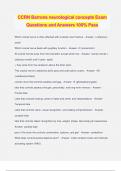
-
CCRN Barrons neurological concepts Exam Questions and Answers 100% Pass
- Exam (elaborations) • 15 pages • 2024
- Available in package deal
-
- $12.49
- + learn more
CCRN Barrons neurological concepts Exam Questions and Answers 100% Pass Which cranial nerve is often affected with a basilar skull fracture - Answer- I (olfactory)- smell Which cranial nerve deals with pupillary function - Answer- III (oculomotor) All cranial nerves arise from the brainstem except which two - Answer- cranial nerves I (olfactory-smell) and II (optic- sight) + they arise from the cerebrum above the brain stem This cranial nerve is tested by doll's eyes and cold caloric ex...
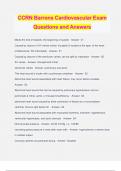
-
CCRN Barrons Cardiovascular Exam Questions and Answers
- Exam (elaborations) • 18 pages • 2024
- Available in package deal
-
- $12.49
- + learn more
CCRN Barrons Cardiovascular Exam Questions and Answers Marks the end of diastole, the beginning of systole - Answer- S1 Caused by closure of AV valves (mitral, tricuspid) & loudest at the apex of the heart (midclavicular, 5th intercostal) - Answer- S1 Caused by closure of the semilunar valves; can be split by inspiration - Answer- S2 AV valves - Answer- tricuspid and mitral semilunar valves - Answer- pulmonary and aortic This heart sound is louder with a pulmonary embolism - Answer- S2 ...
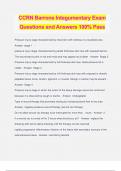
-
CCRN Barrons Integumentary Exam Questions and Answers 100% Pass
- Exam (elaborations) • 2 pages • 2024
- Available in package deal
-
- $10.49
- + learn more
CCRN Barrons Integumentary Exam Questions and Answers 100% Pass Pressure injury stage characterized by intact skin with redness of a localized area - Answer- stage 1 pressure injury stage characterized by partial thickness skin loss with exposed dermis. The wound bed is pink or red and moist and may appear as a blister - Answer- Stage 2 Pressure injury stage characterized by full thickness skin loss. Subcutaneous fat is visible - Answer- Stage 3 Pressure injury stage characterized by ful...
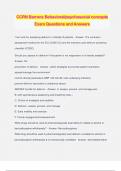
-
CCRN Barrons Behavioral/psychosocial concepts Exam Questions and Answers
- Exam (elaborations) • 3 pages • 2024
- Available in package deal
-
- $10.49
- + learn more
CCRN Barrons Behavioral/psychosocial concepts Exam Questions and Answers Two tools for assessing delirium in critically ill patients - Answer- The confusion assessment method for the ICU (CAM ICU) and the intensive care delirium screening checklist (ICDSC) Should you assess for delirium if the patient is not responsive or is heavily sedated? - Answer- No prevention of delirium - Answer- utilize strategies to promote patient orientation assess/manage the environment control clinical para...
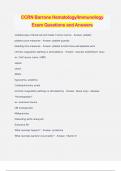
-
CCRN Barrons Hematology/Immunology Exam Questions and Answers
- Exam (elaborations) • 6 pages • 2024
- Available in package deal
-
- $11.49
- + learn more
CCRN Barrons Hematology/Immunology Exam Questions and Answers smallest type of blood cell and made in bone marrow - Answer- platelet platelet count measures - Answer- platelet quantity bleeding time measures - Answer- platelet function/how well platelets work intrinsic coagulation pathway is stimulated by - Answer- vascular endothelium injury ex: Cell trauma (valve, IABP) sepsis shock ARDs hypoxemia, acidemia Cardiopulmonary arrest extrinsic coagulation pathway is stimulated by - Ans...
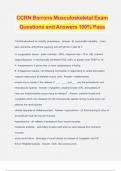
-
CCRN Barrons Musculoskeletal Exam Questions and Answers 100% Pass
- Exam (elaborations) • 3 pages • 2024
- Available in package deal
-
- $10.49
- + learn more
CCRN Barrons Musculoskeletal Exam Questions and Answers 100% Pass Contraindications for mobility progression - Answer- M: myocardial instability - chest pain, ischemia, arrhythmia requiring anti arrhythmic in last 24 h O: oxygenation issues - pulse oximetry < 90%, response rate <10 or >35, extreme fatigue/dyspnea. If mechanically ventilated FiO2 >60% or greater than PEEP of 10 V: Vasopressors- if pt has two or more vasopressors infusing E: Engagement issues- not following comm...
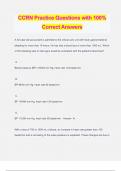
-
CCRN Practice Questions with 100% Complete Solutions A patient has had a large anterior myocardial infarction last month and developed a ventricular aneurysm. He now has episodes of ventricular tachycardia that are not prevented or converted with antidysr
- Exam (elaborations) • 158 pages • 2024
- Available in package deal
-
- $14.49
- + learn more
CCRN Practice Questions with 100% Correct Answers A 52-year-old accountant is admitted to the critical care unit with frank gastrointestinal bleeding for more than 18 hours. He has had a blood loss of more than 1000 mL. Which of the following sets of vital signs would be consistent with the patient's blood loss? A. Blood pressure (BP) 100/84 mm Hg, heart rate 124 beats/min B. BP 86/40 mm Hg, heart rate 92 beats/min C. BP 124/66 mm Hg, heart rate 124 beats/min D. BP 112/60 mm Hg, hea...
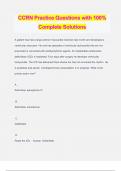
-
CCRN Practice Questions with 100% Complete Solutions
- Exam (elaborations) • 59 pages • 2024
- Available in package deal
-
- $13.49
- + learn more
CCRN Practice Questions with 100% Complete Solutions A patient has had a large anterior myocardial infarction last month and developed a ventricular aneurysm. He now has episodes of ventricular tachycardia that are not prevented or converted with antidysrhythmic agents. An implantable cardioverter- defibrillator (ICD) is implanted. Four days after surgery he develops ventricular tachycardia. The ICD has delivered three shocks but has not converted the rhythm. He is pulseless and apneic. C...
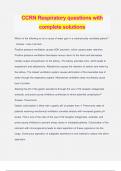
-
CCRN Respiratory questions with complete solutions
- Exam (elaborations) • 51 pages • 2024
- Available in package deal
-
- $13.49
- + learn more
CCRN Respiratory questions with complete solutions Which of the following is not a cause of water gain in a mechanically ventilated patient? - Answer- Loss of protein Positive pressure ventilation causes ADH secretion, which causes water retention. Positive pressure ventilation decreases venous return to the heart and decreases cardiac output and perfusion to the kidney. The kidney secretes renin, which leads to angiotensin and aldosterone. Aldosterone causes the retention of sodium and w...
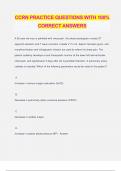
-
CCRN PRACTICE QUESTIONS WITH 100% CORRECT ANSWERS
- Exam (elaborations) • 63 pages • 2024
- Available in package deal
-
- $13.49
- + learn more
CCRN PRACTICE QUESTIONS WITH 100% CORRECT ANSWERS A 62-year-old man is admitted with chest pain. His electrocardiogram reveals ST segment elevation and T wave inversion in leads V1 to V4. Aspirin has been given, and morphine titration and nitroglycerin infusion are used to relieve his chest pain. The patient suddenly develops a loud holosystolic murmur at the lower left sternal border, chest pain, and hypotension 5 days after his myocardial infarction. A pulmonary artery catheter is inser...

How did he do that? By selling his study resources on Stuvia. Try it yourself! Discover all about earning on Stuvia


